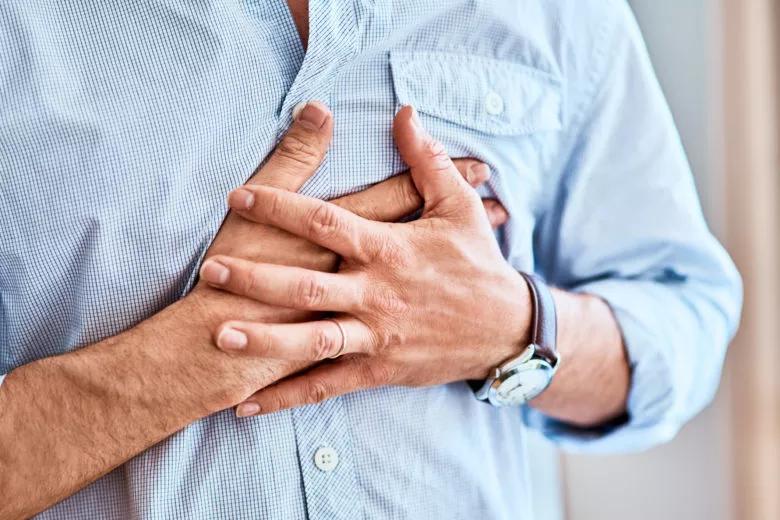Watch out for shortness of breath, fluid buildup + more

Heart failure isn’t a disease. It’s actually a syndrome, which means a collection of symptoms and physical problems caused by injury to, or weakness of, the heart.
Advertisement
Cleveland Clinic is a non-profit academic medical center. Advertising on our site helps support our mission. We do not endorse non-Cleveland Clinic products or services. Policy
In one form of heart failure, the heart is unable to pump enough blood to meet the body’s needs. In the other form, the heart muscle becomes stiff and cannot relax and refill normally.
Heart failure occurs gradually. As the heart gets weaker and weaker, symptoms appear and worsen over time. Because the entire body depends on oxygenated blood supplied by the heart, heart failure affects organs throughout the body.
“It’s good to know the symptoms of heart failure, because they can indicate that your heart is not functioning as well as it should. After you begin treatment, if your symptoms appear less often or become less severe, it tells us that your medications and lifestyle adjustments are working well to keep your heart performing to the best of its ability,” says heart failure specialist David Taylor, MD.
Symptoms not only depend on the severity of heart failure, but also which side of the heart it affects.
The left side of the heart receives oxygen-rich blood from the lungs, so when the left side of the heart fails, blood backs up into the lungs. This makes breathing difficult and can cause fluid to leak into the lungs, producing congestion.
In right-sided heart failure, deoxygenated blood returning to the right side of the heart from the body backs up. This generally causes excess fluid to pool in the legs and ankles, abdomen and gastrointestinal tract.
Advertisement
You might be familiar with the term “congestive heart failure.” Congestion refers to fluid retention. Here are three common symptoms:
Excess fluid also can seep through blood vessel walls into other tissues. This may cause swelling in the legs and ankles or abdomen.
Sometimes fluid accumulates in tissues throughout the body. This may be more difficult to spot. However, patients may experience a rapid weight gain of several pounds in a day or two.
Other symptoms of heart failure are linked to the weak flow of oxygen-rich blood caused by the heart’s weakened pumping power.
Heart failure patients almost universally experience fatigue and weakness, especially with exertion. This occurs because the muscles are not receiving enough oxygen.
When the oxygen supply is limited, the body shunts blood to the most vital organs to try to keep them functioning. This means less blood flows to the hands, feet and skin. The hands and feet may become pale and cool, and the skin may develop a blue tint.
As heart failure worsens, feelings of lightheadedness and dizziness may appear. They are usually signs of low blood pressure or abnormal heart rhythms. Some arrhythmias may be particularly noticeable when you lie on your left side.
Finally, impaired blood flow can cause drowsiness, confusion and a poor memory. These may be symptoms that heart failure is worsening.
Keeping heart-failure patients functioning and out of the hospital is a challenge. That’s why preventing heart failure is wiser.
“Heart attack, high blood pressure and diabetes are major causes of heart failure, and they are largely preventable. That’s why it’s important to do everything you can to control these risk factors and prevent a heart attack,” says Dr. Taylor.
Advertisement
This article originally appeared in Cleveland Clinic Heart Advisor.
Advertisement

Sign up for our Health Essentials emails for expert guidance on nutrition, fitness, sleep, skin care and more.
Learn more about our editorial process.
Advertisement

Limiting sodium consumption can help you manage heart failure

Certain supplements, like licorice root and St. John’s wort, can raise your blood pressure or negatively interact with medication

No, but it momentarily slows down during this involuntary body function

Strokes affect your brain, while heart attacks affect your heart — both can be life-threatening emergencies

It’s an emergency if the pain doesn’t go away, gets worse or you have other worrying symptoms

Age, sex and genetics are just a few factors that can affect your risk of developing coronary artery disease

You may notice a decrease in your LDL ‘bad’ cholesterol in about four weeks

Eating heart-healthy foods, moving around more and getting quality sleep are a few ways to get started

Even small moments of time outdoors can help reduce stress, boost mood and restore a sense of calm

A correct prescription helps your eyes see clearly — but as natural changes occur, you may need stronger or different eyeglasses

Both are medical emergencies, but they are very distinct events with different causes